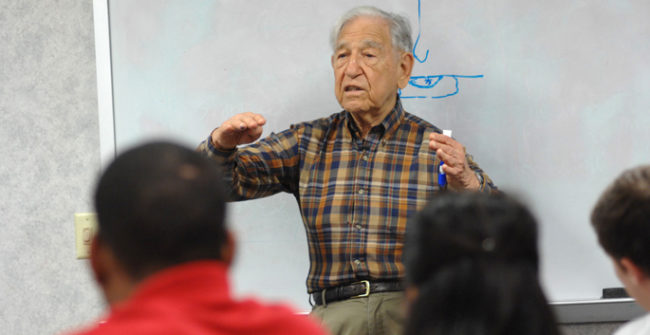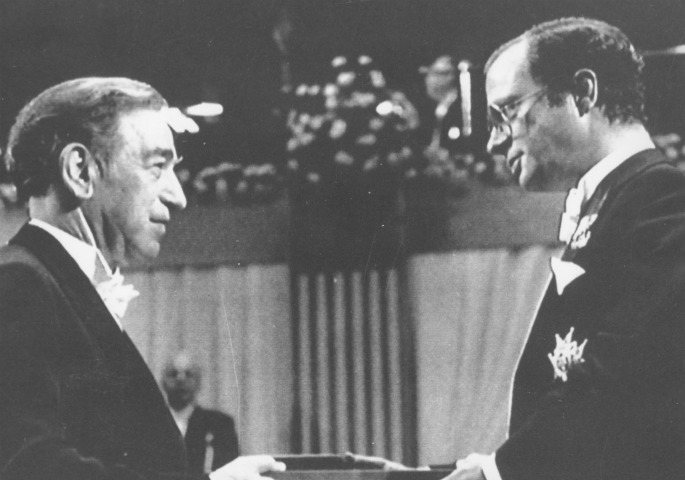
Stanley Cohen, a legendary Vanderbilt University biochemist who was awarded the Nobel Prize for the discovery of epidermal growth factor and its receptor, died in Nashville on Feb. 5. Cohen, distinguished professor of biochemistry, emeritus, was 97.
“Stanley Cohen is someone I have always looked up to—as a fellow academic who studied cells, a visionary researcher and an optimistic spirit,” said Interim Chancellor and Provost Susan R. Wente. “He advanced scientific inquiry in many ways, saving countless lives, inspiring others and earning him the Nobel Prize. His work shows that bold research can have a real impact on our world and the people within it, and it will forever connect him to Vanderbilt’s mission.”
Cohen and his former colleague Rita Levi-Montalcini shared the Nobel Prize in Physiology or Medicine in 1986 for their research, which has sparked the development of a growing number of drugs to fight cancer.
“Stanley was an extraordinary scientist and a great colleague who was loved by everyone at Vanderbilt,” said Dean of Basic Sciences Lawrence J. Marnett, who is University Professor of Biochemistry, Chemistry and Pharmacology and Mary Geddes Stahlman Professor of Cancer Research. “His studies of growth factor signaling illustrate the powerful impact of basic research. Stan’s work not only provided key insights into how cells divide, but it led to the development of many drugs that are used to treat cancer. It was a privilege to have him as a colleague, and we celebrate his accomplishments and his humanity.”
Cohen was born on Nov. 17, 1922, in Brooklyn, New York, the son of a tailor and a homemaker who were Jewish immigrants from Russia. They instilled in Cohen, who was a polio survivor, strong values of intellectual achievement.
Cohen went to Brooklyn College, where tuition was free, majoring in biology and chemistry. He earned a bachelor of arts in 1943. After graduation, Cohen was working at a milk plant, checking the milk trucks for bacteria, when a teacher suggested he apply to the master’s program at Oberlin College, which would cover his tuition and pay him $300 a semester. He received a master of arts in zoology from Oberlin in 1945.
Cohen went on to the University of Michigan, where his doctoral thesis concerned the metabolic mechanism of the earthworm. He spent most nights collecting more than 5,000 earthworms from the university’s campus green. He earned his doctorate in biochemistry in 1948.
Cohen then obtained a postdoctoral position with Viktor Hamburger, a pioneer in the study of nerve growth, at Washington University in St. Louis. He began working with Rita Levi-Montalcini, a visiting scientist from Italy who later shared the Nobel Prize with Cohen for her discovery of nerve growth factor. Cohen stumbled upon another factor—EGF—that stimulated epidermal growth and caused baby mice to open their eyes earlier than normal.
Cohen joined the Vanderbilt faculty in 1959 as an assistant professor of biochemistry. He set up his own research group with a handful of postdoctoral fellows and isolated EGF and characterized its receptor with Graham Carpenter, professor of biochemistry, emeritus.
“Dr. Cohen’s discovery of the EGF receptor has revolutionized the care and outlook for millions of cancer patients worldwide,” said Jeff Balser, dean of the School of Medicine and president and CEO of Vanderbilt University Medical Center.
“His Nobel-winning discovery formed the foundation for an entirely new area of research and significantly expanded our understanding of multiple types of diseases,” Balser said. “Despite his enormous success, Dr. Cohen remained humble and was a generous mentor to generations of scientists who followed in his footsteps.”

Cohen became the second Vanderbilt faculty member after Earl Sutherland to win the Nobel Prize in Physiology or Medicine.
Cohen also won many other major awards in science, including the Albert Lasker Basic Medical Research Award, which he also shared with Levi-Montalcini, and the President’s National Medal of Science, which he accepted from President Ronald Reagan at a White House ceremony on March 12, 1986. In 2016, he was inducted into the Tennessee Healthcare Hall of Fame.
Cohen retired from Vanderbilt with emeritus status in 1999, but he occasionally returned to Vanderbilt to speak to groups and especially enjoyed interacting with students. “Many new things are found by accident,” he told a group of high school students in 2007. “If you’re prepared to see the accident, you can find it.”
He is survived by his wife, Jan Jordan, BA’78; three children; and two granddaughters. In lieu of flowers, memorial donations may be made to the Stanley Cohen Innovation Fund at Vanderbilt University, established to support innovative and high-risk research.
Bill Snyder and Lorena Infante Lara contributed to this story.